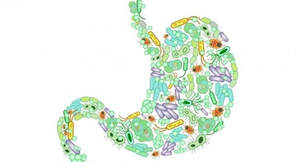Article Review - Curiosus - Vol. 1 Spring 2018

This article summarizes an elegant work by Thaddeus S. Stappenbeck, MD, PhD. Publishing in the Journal Science 2017 August 04; 357 (6350): 498-502, he and his group showed that certain beneficial gut bacteria convert flavonoids (pigments found in plant foods) into a molecule called desamino-tyrosine (DAT). They showed that DAT protects animals from influenza by up-regulating the production of Interferon, an antiviral, immune-cell-derived protein.
This study, and other works from Dr. Stappenbeck lab, brings home that in order to fend off infections, we must both be ingesting a plant pigment rich diet with abundant fiber and have a healthy microbiome. The result is that beneficial germs for whom we provide a home in our intestines will provide us with molecules which keep our immune system vigilant and able to destroy pathogenic invaders such as the flu virus. However, we must feed them (and ourselves) the right food. This is the ultimate symbiotic relationship in an ecological system.
An integral part of staying well is reducing the total load of factors that damage health.
In this case, this includes toxic foods that are devoid of fiber and bioflavonoids etc. In addition, to reducing the total load, we must provide essential nutrients which we are unable to synthesize (Vitamins, D, A, C, Zinc, Selenium, etc.) so we and our microbiome can stay well even in the face of pathogen exposure and invasion.
This study, and other works from Dr. Stappenbeck lab, brings home that in order to fend off infections, we must both be ingesting a plant pigment rich diet with abundant fiber and have a healthy microbiome. The result is that beneficial germs for whom we provide a home in our intestines will provide us with molecules which keep our immune system vigilant and able to destroy pathogenic invaders such as the flu virus. However, we must feed them (and ourselves) the right food. This is the ultimate symbiotic relationship in an ecological system.
An integral part of staying well is reducing the total load of factors that damage health.
In this case, this includes toxic foods that are devoid of fiber and bioflavonoids etc. In addition, to reducing the total load, we must provide essential nutrients which we are unable to synthesize (Vitamins, D, A, C, Zinc, Selenium, etc.) so we and our microbiome can stay well even in the face of pathogen exposure and invasion.

